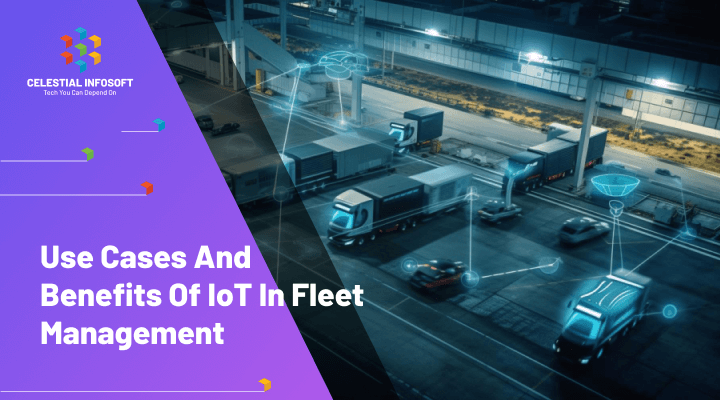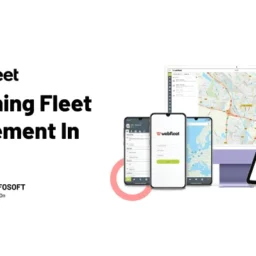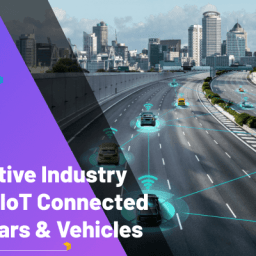
The transportation and logistics industry is going through a digital transformation, fueled by the growing use of Internet of Things (IoT) technology. Fleet management, or controlling a fleet of vehicles, is an important part of many businesses, including logistics, delivery, and transportation. The integration of IoT into fleet management offers opportunities for efficiency, safety, and cost savings. From real-time vehicle tracking to predictive maintenance, IoT offers a full set of tools that help fleet managers optimize operations and make decisions based on data.
In this article, we’ll look at important use cases and the advantages of IoT in fleet management, highlighting how new technologies are changing the transportation business.
What are the use cases of IoT in fleet management?
The uses of IoT in fleet management are numerous, allowing fleet managers to take advantage of real-time data and predictive analytics to improve decision-making and operational efficiency. Fleets that utilize IoT technologies can save money, improve safety, and optimize logistics. Here are a few significant use cases:
1. Real-time Vehicle Tracking and Monitoring
Real-time vehicle tracking is one of the most popular IoT applications in fleet management. GPS devices and IoT connected smart vehicles give real-time data on location, speed, and route. This information lets fleet managers monitor vehicle movement, ensure on-time delivery, and respond quickly to unexpected delays or issues.
2. Predictive Maintenance
IoT sensors regularly track car health indicators including engine temperature, oil level, and tire pressure. Fleet managers can use this data to identify maintenance needs before a problem occurs Predictive maintenance decreases downtime, increases vehicle lifespan, and lowers repair costs.
3. Consumption Management
Fuel is an important expense for fleet operators. IoT sensors can track fuel levels, find inefficiencies in fuel consumption, and identify behaviors like as idling and rough driving. These insights enable fleet managers to apply fuel-saving techniques and save money.
4. Driver Behavior Monitoring
Monitoring driver behavior is important for upholding safety requirements. IoT devices can detect conditions such as sudden braking, speeding, and quick acceleration. This data helps managers detect unsafe driving habits, allowing them to provide targeted training and incentives to encourage safer driving practices.
5. Route Optimization
IoT devices can deliver real-time information about traffic conditions, road closures, and weather. This data enables fleet managers to plan and alter routes dynamically, preventing delays and saving fuel. Route optimization also lowers delivery times and increases customer satisfaction.
6. Remote diagnostics
IoT devices allow for remote diagnostics of vehicles, delivering information on possible issues such as engine defects or battery conditions. Fleet managers can use this data to set up quick repairs, minimizing costly roadside breaks.
7. Freight Monitoring
For fleets providing sensitive goods such as food or pharmaceuticals, IoT sensors monitor temperature, humidity, and vibration to guarantee the cargo remains in ideal condition. Alerts can be provided to the fleet manager if any parameter differs from the expected range, allowing for timely correction.
8. Compliance and Regulatory Compliance
Fleets can use IoT devices to help them comply with regulatory norms such as driver Hours of Service (HOS). Electronic logging devices (ELDs) automatically record driving hours, assuring compliance while lowering the possibility of fines or penalties.
9. Fleet Utilization Analysis
IoT gives information on car usage, mileage, and idle hours. Fleet managers can use this data to identify unused cars, allowing for better fleet distribution and maximum utilization.
What are the benefits of IoT in fleet management?
The advantages of IoT in fleet management are numerous, allowing enterprises to improve operational efficiency, lower costs, and improve safety. Fleet managers can improve fleet performance and customer service by using real-time data and predictive analytics. The following are some of the primary benefits.
1. Enhanced operational efficiency
By offering real-time visibility into fleet operations, IoT lets managers optimize routes, eliminate idle times, and assure timely delivery. Improved efficiency leads to more effective resource allocation and cost reductions.
2. Reduced maintenance costs
Predictive maintenance reduces the likelihood of unexpected breakdowns by detecting problems early. This proactive strategy reduces repair costs and increases vehicle life.
3. Improved Safety
Monitoring driver behavior, offering focused training, and keeping cars in good condition all help to lower the likelihood of accidents. Safety alarms and compliance monitoring also help build a safer working environment for drivers.
4. Lower Fuel Consumption
Route optimization, idling reduction, and driver behavior monitoring can all help to reduce fuel use significantly. IoT data enables fleet managers to use methods that immediately correct problems.
5. Better customer service
Real-time tracking enables clients to receive precise arrival estimates, while route optimization reduces delivery delays. Improved customer service leads to increased satisfaction and loyalty.
6. Regulatory Compliance
Automated logging and tracking ensure respect for industry laws, lowering the risk of fines and legal complications. Compliance data is also useful for audits and inspections.
7. Improved asset utilization
Managers can increase productivity by examining fleet usage statistics and redeploying unused cars. This eliminates the need to invest in more automobiles.
8. Scalability and Growth
IoT-based fleet management systems can scale with your business, allowing for more vehicles and increased operations without requiring major overhauls or adjustments.
9. Data-Driven Decision Making
The large amount of data generated by IoT devices delivers relevant insights to fleet managers, allowing them to make informed decisions. This data supports ongoing improvement across budgeting and resource allocation.
The Bottom Line
The benefits of IoT in fleet management are obvious. The ability to track cars, drivers, and cargo in real time has changed the way fleet managers manage their operations. IoT enables organizations to optimize performance while cutting expenses and satisfying customer expectations by providing predictive maintenance, increased fuel efficiency, and greater safety. Whether your fleet is large or small, implementing IoT technologies can result in significant increases in efficiency and profitability. Adopting IoT today means investing in a better, safer, and more efficient fleet management tomorrow.




